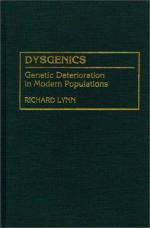|
This section contains 386 words (approx. 2 pages at 300 words per page) |
Dysgenic refers to a counter selection pressure reproduction frequency within a population. A population is termed dysgenic if it exhibits either enhanced reproduction levels among organisms with seemingly undesirable characteristics, or if it exhibits diminished reproduction among organisms with seemingly desirable characteristics. In some cases, a dysgenic population may exhibit both forms of imbalance.
Although rejects by modern geneticists, concepts related to dysgenics are sometimes used in order to support a controversial dysgenic hypothesis. With regard to human populations, the term dysgenic refers to reproduction levels among populations with characters or traits that would seemingly inhibit reproductive success
Although there have been attempts to correlate specific alleles (forms of genes) with specific behaviors, even with an increasingly sophisticated array of genetic tools, there remains only a tenuous link between genes and specific sociological or psychological traits. Aside from complex interactions of alleles (and of differing genes) there is also the difficulty of assignment a proper role to environmental influences.
Because the term dysgenic is a qualitative term, there are severe restrictions and limitations regarding the validity of data collected from dysgenic studies. In addition to generalized questions regarding definitions and language (semantics) there are wide differences in the extent of objective measurement present in such studies. Critics of the dysgenic hypothesis assert the a high degree of subjectivity creates a situation wherein dysgenic characters may be dysgenic because the expressed traits and behaviors are already outside of cultural or social norms.
Despite the fact that I.Q. scores have risen over the last fifty years, proponents of the dysgenic hypothesis-- chief among them Richard Lynn, emeritus professor of psychology at the University of Ulster--assert that dysgenic reproduction could lead to a decline in human intelligence as measured by standardized I.Q. tests. Lynn asserts that less intelligent people having more children at an earlier age will lead to a lowing of the general population I.Q. average.
Lynn's claims of a definitive link between genes, intelligence and social class remain unproven by modern genetics analysis or advanced mathematical models of population genetics.
Moreover, critics of the dysgenic hypothesis assert that such genetic links have never been proved and that proponents of the dysgenic hypothesis are using either faulty or highly selected data to assert a dysgenic hypothesis regarding human intelligence and selected social traits.
|
This section contains 386 words (approx. 2 pages at 300 words per page) |


